人教版必修4 unit 2 (working the land)单词+定语从句课件(共82张ppt)
文档属性
| 名称 | 人教版必修4 unit 2 (working the land)单词+定语从句课件(共82张ppt) |

|
|
| 格式 | pptx | ||
| 文件大小 | 6.1MB | ||
| 资源类型 | 教案 | ||
| 版本资源 | 人教版(新课程标准) | ||
| 科目 | 英语 | ||
| 更新时间 | 2021-02-03 00:00:00 | ||
图片预览


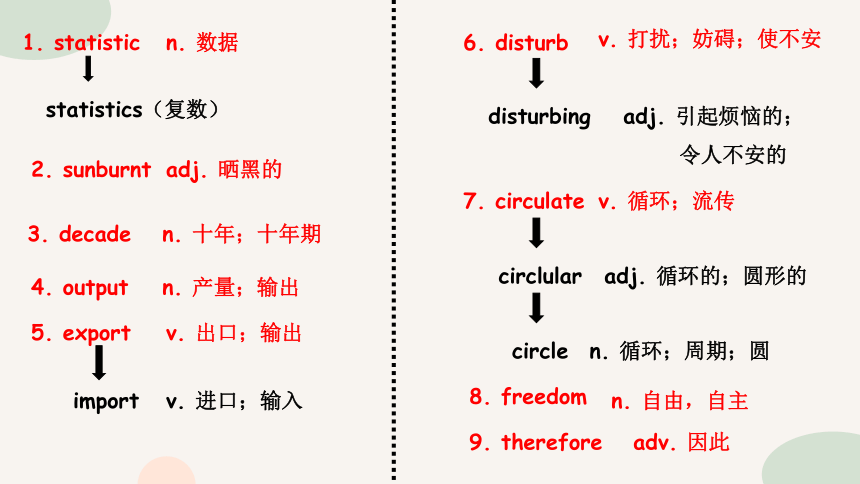


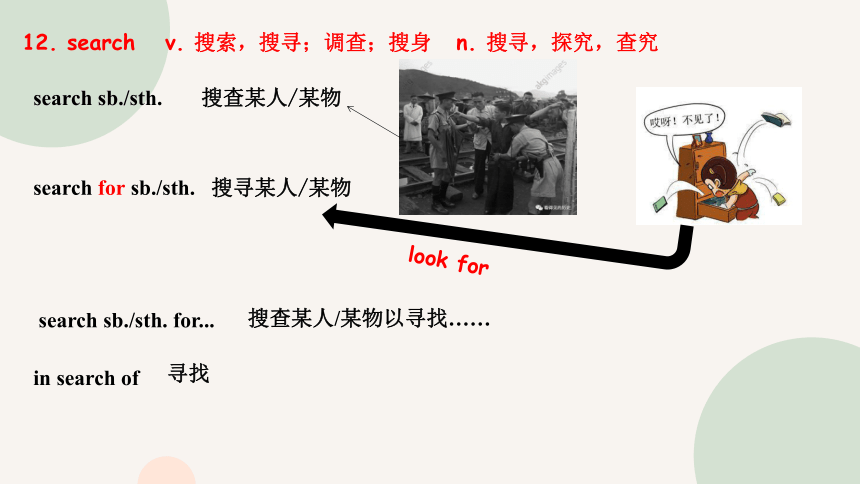

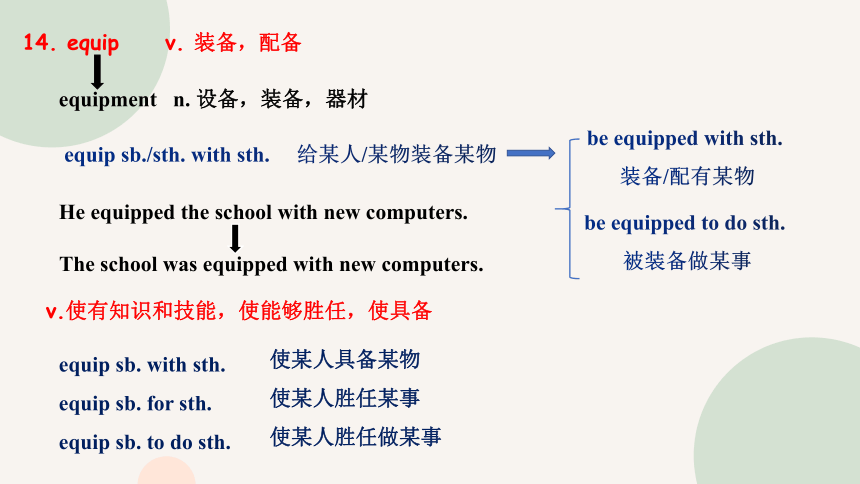

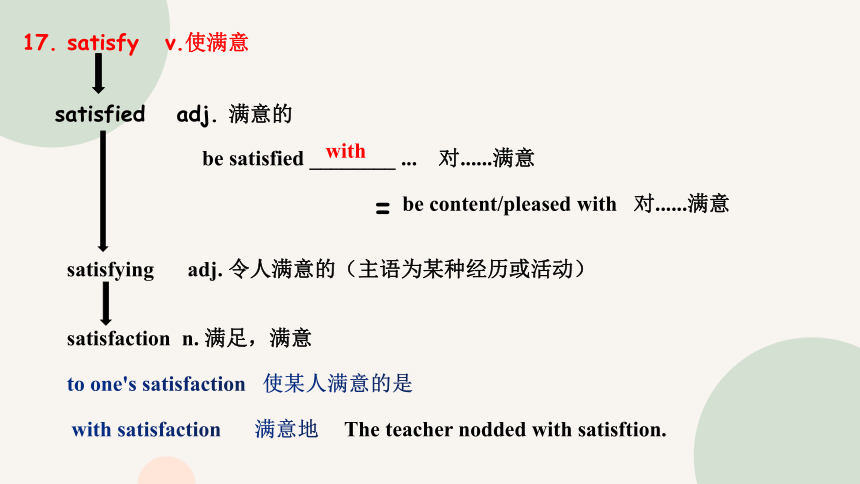

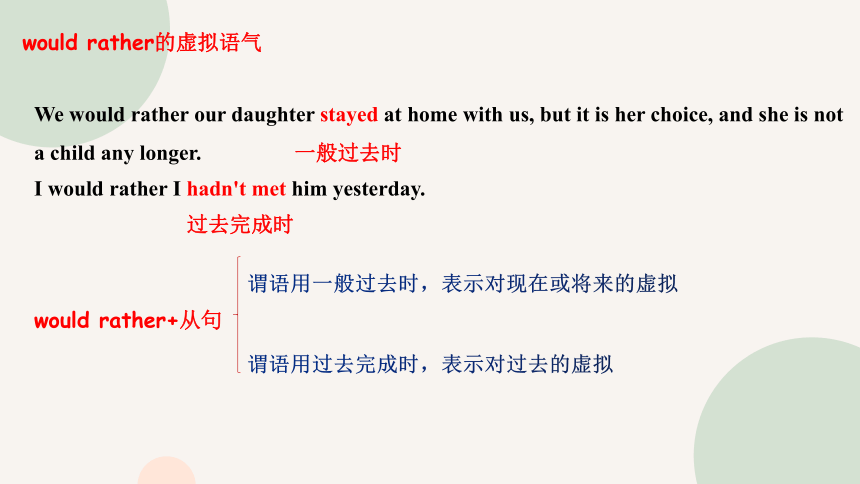
文档简介
unit 2 Wokring the land
词汇短语
1. statistic
n. 数据
statistics(复数)
2. sunburnt
adj. 晒黑的
3. decade
n. 十年;十年期
4. output
n. 产量;输出
5. export
v. 出口;输出
import
v. 进口;输入
6. disturb
v. 打扰;妨碍;使不安
disturbing
adj. 引起烦恼的;
令人不安的
7. circulate
v. 循环;流传
circlular
adj. 循环的;圆形的
circle
n. 循环;周期;圆
8. freedom
n. 自由,自主
9. therefore
adv. 因此
10. struggle
v./n. 斗争;拼搏,努力
struggle ____________ 为......而斗争、奋斗
struggle ____________ 与......斗争
for
against/with
struggle _______ (do) 努力做某事
to do
动词短语
a struggle for... 争取......的斗争
a struggle with/against ... 与......的斗争
名词短语
struggle to one's feet
挣扎着站起来
11. expand
v.扩大,增加,增强(尺码、数量或重要性)
Metals expand when they are heated.
Expanding your knowledge by reading more books is a wise choice.
expansion
expandable
adj. 可膨胀的,可扩大的
n. 膨胀;扩张;扩展
12. search
v. 搜索,搜寻;调查;搜身
search sb./sth.
search for sb./sth.
search sb./sth. for...
搜查某人/某物以寻找……
n. 搜寻,探究,查究
搜查某人/某物
搜寻某人/某物
look for
in search of
寻找
13. rid
v.使摆脱;使除掉
rid ..._____ sth. 使......摆脱或出去某物
Doctors try their best to rid us of disease.
of
get rid of
常与of搭配的短语
rob sb of sth
warn sb of sth
remind sb of sth
inform sb of sth
cure sb of sth
摆脱;丢弃;扔掉
It's time we got rid of all these old toys.
抢劫某人某物
警告某人某事
提醒某人某事
通知某人某事
治好某人的某种疾病
14. equip
v. 装备,配备
equipment n. 设备,装备,器材
He equipped the school with new computers.
equip sb. with sth.
equip sb. for sth.
equip sb. to do sth.
equip sb./sth. with sth. 给某人/某物装备某物
The school was equipped with new computers.
be equipped with sth.
装备/配有某物
be equipped to do sth.
被装备做某事
v.使有知识和技能,使能够胜任,使具备
使某人具备某物
使某人胜任某事
使某人胜任做某事
15. thanks to
由于,幸亏,因为
Thanks to the development of online technology, many small businesses have been growing.
due to; as a result of; because of; owing to
表示由于,因为的短语:
She has been absent from work illness.
due to
because of
owing to
as a result of
17. satisfy
v.使满意
be satisfied ________ ... 对......满意
with
be content/pleased with 对......满意
=
satisfying
adj. 令人满意的(主语为某种经历或活动)
satisfied
adj. 满意的
satisfaction
n. 满足,满意
to one's satisfaction
使某人满意的是
with satisfaction
满意地
The teacher nodded with satisftion.
18. would rather
宁愿,宁可
I would rather not go to the theatre ths evening.
would rather do sth. than do sth.
would do sth. rather than do sth.
prefer to do sth. rather than do sth.
表示“宁愿......也不愿....../与其......倒不如......”的搭配
I would rather stay at home than go out on such a rainy day.
I would stay at home rather than go out on such a rainy day.
I prefer to stay at home rather than go out on such a rainy day.
would rather的虚拟语气
We would rather our daughter stayed at home with us, but it is her choice, and she is not a child any longer.
I would rather I hadn't met him yesterday.
一般过去时
过去完成时
would rather+从句
谓语用一般过去时,表示对现在或将来的虚拟
谓语用过去完成时,表示对过去的虚拟
19. rather than
He ran here rather than walked.
3)rather than有时起连词作用,连接两个并列的成分。
1)而不是
2)与其说......不如说
We like dancing rather than singing.
we should help them rather than he should help us.
I decided to write a letter rather than telephone.
He is an explorer rather than a sailor.
与其说他是一个海员,不如说他是一个探险者。
连接两个不定式时,第二个不定式常省略
Jenny, rather than her two brother _____(be) leaving for Shanghai.
is
20. make a difference
有影响,有作用,有关系
Changing schools made a big difference to my life.
It makes a difference to me whether he goes or not.
make no/some difference
make a difference to/in sb./sth.
It makes a difference to sb.+从句
没有/有些影响
make all difference (to sb./sth.)
(对某人/某物来说)关系重大
tell the difference
区分/区别不同
定语从句
a lovely dog
a boy in blue
a boy who likes singing
something useful
1. 先行词与关系词
2. 限制性定语从句与非限制型定语从句
3. 关系代词与关系副词的选用
4. 介词+which/whom的用法
录
目
1. 先行词与关系词
Do you know the man.
They are talking about the man.
Do you know the man who they are talking about.
Can you lend me the book.
You borrowed it from the library.
Can you lend me the book that you borrowed from the library.
先行词
关系词
关系代词
指人:
that
who
whom
whose
as
可作主语,宾语,表语
可作主语,宾语,表语
作宾语
作定语
可作主语、宾语、表语
作宾语可省
作宾语可省
可省
不可省
不可省
指物:
that
which
whose
as
可作主语,宾语,表语
可作主语,宾语,表语
作定语
可作主语、宾语、表语
作宾语可省
作宾语可省
不可省
不可省
2. 限制性定语从句和非限制性定语从句
形式不同、功能不同、翻译不同、先行词不同
1. 形式不同
My sister who works in Shanghai sends me an e-mail almost every day.
My sister, who works in Shanghai, sends me an e-mail almost every day.
限制性定语从句
非限制性定语从句
限制性定语从句主从句不用“,”隔开;限制性要用“,”隔开
2.功能不同
This is the place that/which she would like to visit.
This is New York, which I have visited for several times.
限制性定语从句,对先行词进行修饰、限定,如果去掉句义会发生改变,甚至不能成立
非限制性定语从句,对先行词起补充说明的作用,如果省略,对句意没有太大影响
3.翻译不同
He is the man whose car was stolen.
I've invited Jim, who lives in the next flat.
限制性定语从句翻译在它所修饰的先行词之前
非限制性定语从句与主句分开翻译
他就是汽车被窃的那个人。
我已经邀请了汤姆,他就住在隔壁。
4. 先行词不同
The amber which was selected had a beautiful yellow-brown color likr honey.
Charles Smith, who was my former teacher, retired last year.
He was generous with time, for which I was grateful.
My house, which I bought last year, has got a lovely garden.
限制性定语从句的先行词只能是名词或代词。
非限制性定语从句的先行词可以是名词、代词、短语或整个句子。
3. 关系代词的用法
who/whom
who
whom
在从句中作主语、宾语、表语
在从句中作宾语
作宾语时,都可省
1)Do you the doctor? He comes here once a month and examines the workers.
Do you the doctor who comes here once a month and examines the workers.
2)He is our new English teacher. I talked with him this morning.
He is our new English teacher who/whom I talked with this morning.
This letter is from my elder brother. He serves in the army
The letter is from my elder brother who serves in the army.
The next King of Prussia, Frederick William I, to whom the amber room belonged, decided not to keep it.
Peter, whom you met in London, is now back in Paris.
whom引导的非限制性定语从句
介词+whom
注意:
1. 从句中的介词提到关系代词前,whom直接在介词后作宾语,不可用whom代替。
2. 在非限制性定语从句中,who也不可代替whom
that(人/物)
She is the girl ____________ lives next door.
在限制性定语从句中,常作主语、宾语、表语,作宾语可省。
that/who
He is not the man _______________ he seems to be.
You must like the film _____________ I saw last Evening.
that/who/whom
The foreign guest is Mr. Green __________________you saw at the school gate.
that/who/whom/省
that/which/省
which
常作主语、宾语、表语,作宾语时,且不直接跟在介词之后,可省。
Among the many dangers _______________ sailors have to face, probably the greastest of all is fog.
Electricity is a form of energy which/that is used for heating and lighting, and to provide power for machines.
Electricity is a form of energy. It is used for heating and lighting, and to provide power for machines.
The factory has developed new products one after another. We visited the factory last week.
that/which/省
The factory has developed new products one after another. We visited the factory last week.
whose
在定语从句中作定语,后面要接名词,意为“......的”,可指人或物
1)In our class there are 46 students, of __________ half ear glasses.
2)Ted came for the weekend wearing only a pair of shorts and T-shirt, ________ was a stupid thing to do in such weather.
3)The house __________ windows face south is ours.
4)They were well trained by their masters _____________ had great experience with caring for these animals.
5)I live next door to a couple ___________ children often make a lot of noise.
6)On the edge of the jacket, there is a piece of cloth ___________ gives off light in the dark.
whom
which
whose
which/that
whose
which/that
as
引导定语从句时,常有固定结构
2. 固定表达:
1. 用在the same ...as...;such ...as...; as...as...; so...as...结构中
Such peple as habe made great contributions to the world be greatly respected.
He is a true hero, as is reported in the newspaper. 正如报纸上报道的那样,他是一个真正的英雄。
as we all know
as is well known
as I can remember
as often happens
as we expect
as you see
as has been said before
as the old saying goes
as may be imagined
只用that不用which的情况
point 1
All that can be done has been done.
I refuse to accept the blame for something that was someone else's fault.
先行词为不定代词或被不定代词修饰时
all, none, few, little, any, the one, something, everything, anything...
point 2
Australia is the only country that is also a continent.
This train is the last one that will go to Suzhou.
先行词被the only, the very, the last, the same修饰时
point 3
The first thing (that) we should do now is to find a local guide.
先行词是序数词或被序数词修饰时
point 4
This is the best method that has been used to prevent pollution.
This is the best way that can solve the problem.
先行词是最高级或被最高级修饰时
point 5
We often talk about persons and things (that) we remember.
先行词既有人又有物时
point 6
He built up a factory which produced things that had never been seen beofre.
在双重定语从句中,其中一个关系代词用which,另一个则用that
point 7
There is a book on the desk that belongs to Frank.
以here,there开头的句子,先行词指物时
point 8
Which is the book that belongs toher?
当主句是以what或which开头的特殊疑问句时
只用which不用that的情况
point 1
Care of the soul is a gradual process in which even the small details of life should be considered.
当关系代词前有介词时,只用which
point 2
Football, which is a very interesting sport, is played in many countries.
引导非限制性定语从句时
point 3
What's that which was put in the car?
先行词为that,those时
point 4
Here is a CD which, as I have told you, is a great help to you.
关系代词后有插入语时
1.nationality
n.国籍
nation n. 国家;民族
2. chemical
adj. 化学的 n. 化学物质
chemistry
n. 化学
3. fertile
adj. 肥沃的
fertilizer
n. 肥料;化肥
4. personality
n. 性格,个性,人格
person
n. 人
perosonal
adj. 个人的,私人的
personally
adv. 亲自=in person
5. organic
adj. 有机的
6. pest
n. 害虫
national adj.. 国家的,民族的,全国的
7. soil
n. 土壤
8.productin
n. 生产,制造
produce v. 生产
producer
n. 生产者;制作人
9. industrial
adj. 工业的
industry
n. 工业
10. underline
v. 画底线标出,强调
11. discovery
n. 发现
discover
v. 发现
product n. 产品
12. nutrition
n. 营养;滋养;食物
13. mineral
n. 矿物;矿山
14. soil
n.土壤
15. skim
v. 浏览;略读
16. confuse
v.使困惑,使糊涂
confuse A with B
将......和......混淆
confusion n. 困惑;混淆
confused adj. 糊涂的,难懂的,困惑的
confusing
adj. 令人困惑的,难以理解的
17. regret
v.后悔(做了某事);对......感到遗憾
regret doing/having done sth. 后悔做了......
I regret leaving school so young.
regret (that)+... 对......感到遗憾,抱歉
regret to say/inform/ tell 遗憾的说,告知,告诉
I regret to inform you that your application has been refused.
我很遗憾的通知您,您的申请被拒绝了。
n. 后悔,遗憾
to one's regret 令某人感到遗憾的是 with regret 遗憾地
18. focus
v.把......集中于......
focus ________ ...
on
关注于......
focus one's attention/eyes/mind/efforts on...
n. 焦点
the focus of ...
......的焦点
19. reduce
v.缩小,减少,降低
reduce sth (from...) to...
reduce sth by...
The workforce has been reduced by half. 雇员总数已将减少了一半。
The new bridge should reduce travelling time from 50 minutes to 15 minutes.
(从.....)减少到......
减少了......
20. build up
1)使发展,使形成
They have building up their military strength.
2)加强,加大
Tension is building up between the two countries da by day.
3)增强......的体力
Ding exercise can build up our strength.
4)(使)逐渐增加;(使)扩大
The collection has been built up over the last seventeen yeras.
21. comment
n. 评论,意见
comment on/about 关于......的评论
make a comment on/ about 对......做出评论
no comment
无可奉告
comment on.../comment that
v. 评论,发表意见
22. lead to
v. 导致,造成;通向
lead sb to do sth.
lead a ....life
lead the way
引路,带路
使某人做......
过着......生活
23. keep...free from
使......免受......的影响
使......不含(有害物质)
We should keep ourselves free from drugs.
We should try our best to keep our drinks free from artificial colourings.
倍数表达:
1. 倍数+as+形容词/副词原级+as
2. 倍数+形容词/副词比较级+than
3. 倍数+the+名词+of
Jack runs three times as fast as Jim.
The Yangtze River is almost twice longer than the Pearl River.
It is said that this lake is twice the width of that one.
He intends to offer you ten times what Tom has offered to you.
4. 倍数+what从句
it
I find ______ quite necessary to make some changes.
He made _______ clear that he would go to the party next Sunday.
I think ______ no use quarreling with him about it.
it
it
为了保持句子平衡,常用it做形式宾语,将真正的宾语放在句尾。it作形式宾语可以代替-ing、to do不定式、名词性从句等。
常以it作形式宾语的动词(短语)有consider,think,make,find,believe, feel,depend on等。
指人,只用who不用that的情况
point 1
Those who dare to break the law will be punished.
当先行词是 one, ones, anyone 或 those等时
They offer help and advice to anyone who is interested in becoming a teacher.
point 2
当先行词是人,关系代词在从句中做主语并与从句谓语动词分割时,用 who
She is an artist who, if given enough time, will work wonders.
point 3
当先行词是人,关系代词在从句中做主语并与从句谓语动词分割时,用 who
She is an artist who, if given enough time, will work wonders.
point 4
当一个表示人的先行词后有两个定语从句时,第二个定语从句必须用who/whom引导,且不能省略。
The man that spoke at the meeting is our new headmaster who has just come from Shanghai.
point 5
当先行词是he, they等时,在一些谚语中或一些较长且复杂的句子中,定语从句多用who引导。
They who can suffer long tears of patient toil and constant efforts will succeed.
那些能经受常年耐心操劳和不断努力的人会成功。
He who plays with fire gets burned. 玩火自焚。
4. 关系副词的用法
{5C22544A-7EE6-4342-B048-85BDC9FD1C3A}先行词
关系副词
在从句中的作用
与“介词+关系代词”的关系
表示时间的名词:
time, day, year等
表示场所的名词:
park, place, country, house等
表示理由的名词
when
作时间状语
=at/in/on/during which
where
作地点状语
=in/at/to/on which
why
作原因状语
=for which
when
=at/in/on/during which
where
why
when
指时间,在定语从句中做时间状语
先行词通常为:time, day, year,period, occasion(机会,时机),age(表时间)
The two countries were at war during the time.
There was a time when the two countries were at war. 这是两国交战的时期。
We live in an age when more information is available with greater ease than every before.
more information is available with greater ease than every before at the age.
There used to be a time _______ the Chinese people struggled for freedom.
The Chinese people struggled for freedom during the time.
when = 时间介词+which
when
There used to be a time during _______ the Chinese people struggled for freedom.
which
I still remember the days _______ I met my best friends in my life.
I still remember the days __________ I spent with you in the village.
when
which/that
I still remember the days in _______ I met my best friends in my life.
which
where
指地点,在定语从句中做地点状语
先行词通常为:place, town, country, room等表示地点的名词
You will meet with the Maoris and join them in dance in the place.
There will be the place where you will meet with the Maoris and join them in dance.
这将会是你会看见毛利人并和他们一起跳舞的地方。
Ancient China is a place where states were often at war with each other.
古代的中国是各诸侯国之间经常发生战争的地方。
States were often at war with each other in the place.
where
先行词还可以是一些具有抽象意义的词:case(情况), situation(情况,处境), point(点), scene(场面), stage(阶段), position(位置), condition(情况), occasion(场合)
I am supposed to make decisions of my own at the point.
I have reached a point in my life where I am supposed to make decisions of my own.
There is a company in _______ I used to work.
There is a company _______ I used to work.
where=时间介词+which
where
which
There is a company _______ I used to work in.
which
I remember the house _________ my father built in my childhood.
which
I remember the house ___________ I lived during my childhood.
where/that
I remember the house in ________ I lived during my childhood.
which
why
指原因,在定语从句中作原因状语
先行词通常为:reason
He was late for school for this reason.
He couldn't give the teacher a good reason why he was late for school.
The reason why he didn't win the match is that he was so nervous.
He didn't win the match for the reason.
This is the reason for _______ he came late to school.
This is the reason ________he came late to school.
why=for +which
I'd like you to explain the reason ______ you were late again.
I'd like you to explain the reason for ______ you were late again.
The boss doesn't want to hear any reason ___________ you might give.
why
which
why
which
which/that
way和time后定语从句的选择
point 1
way后面的定语从句
The way _____________ he explained to us was quite simple.
他向我们解释的那种方法很简单。
There are several different ways _____________ we can tackle this problem.
我们可以用几种不同的方法处理这个问题。
that/which/省
that/which/省
如果先行词way后面的定语从句中缺少宾语,则用______ 或______或___________
如果定语从句中缺少方式状语,则用_________, __________或_____________
that
which
省略关系词
that
in which
省略关系词
point 2
time后面的定语从句
There is the second time ________ the President has visited the country.
There was a time __________________ there were no radios, no telephones and no TV sets.
that
when/during which
若time表示“次数”时,应用关系词___________, 也可省略关系词。
若time表示“一段时间”,应用关系副词________________________n引导定语从句。
that
when或at/during which
whose和of which/whom
The house ________ windows face south is ours.
This is the scientist _________ achievements are well known.
whose
whose
The house of which the window face south is ours.
The house the window of which face south is ours.
This is the scientist of whom achievements are well know.
This is the scientist the achievements of whom are well know.
定语从句的主谓一致
Here is a letter from Mr. Brown , who ______ to come to Paris.
Here is a letter from the Browns, who _______ to come to Paris.
wants
wants
在定语从句中,关系代词作从句中主语时,从句中谓语动词的人称和数要与先行词保持一致。
He is one of the students who ______ made great progress.
He is the only one of the students who _______ made great progress.
have
has
“one of the +名词(复数)”位于关系代词前时,先行词是复数名词,故从句的谓语动词用复数形式。
但当one前有the, the only, the very等修饰时,先行词是the/the only/the very one,故从句的谓语动词要用单数形式。
非限制性定语从句还能将整个主句作为先行词,对其进行修饰,这时从句谓语动词要用第三人称单数形式。
It is the tird time that she has won the race, which ______(have) surprised us.
My friend showed me around the town, which ______(be) very kind of him.
has
was
定语从句中的省略
point 1
关系代词在定语从句中作动词的宾语时可以省略。
That's the girl ( that/whom/who ) I met yesterday.
point 2
John is not the man (that) he was years ago.
关系代词在定语从句中作动词的表语时可以省略。
point 3
在某些表示时间的名词(短语)后关系副词可以省略,如the time, every time , each time, the moment 等。
Do you remember the day (when) we first went to school.
point 4
This is the place (where) we first met.
在某些表示地点的名词(短语)后关系副词有时可以省略,如the place。
point 4
This is the reason (why) he was late.
先行词the reason后面的关系副词有时省略。
has connection with
are intended for
carrying on
come across
was free from
by chance
refers to
look down upon
set up
caught my eye
chemical
discoveries
summary
reduced
ocused
skimmed
roduction
comments
root
egretted
modestly
modesty
medical
intention
delivery
consideration
inspiring
inspired
inspiration
entertaining
specilizes
has
make
have been wore
enjoys
are added
have been tired
is
are
has been invited
were searching
seem
are held
is
was gained
connection
hasn't been decided
1.
2.
3.
4.
5.
6.
______
____
____
___
_
__________
As
whose
when
that
are
where
7.
8.
9.
10.
11.
______
_____
______
______
______
As
that
that/which
knows
whom
16.
15.
14.
13.
12.
15.
14.
13.
__________
_____
with
_____
____
____
when
which
whose
which
whom
谢谢您的观看
词汇短语
1. statistic
n. 数据
statistics(复数)
2. sunburnt
adj. 晒黑的
3. decade
n. 十年;十年期
4. output
n. 产量;输出
5. export
v. 出口;输出
import
v. 进口;输入
6. disturb
v. 打扰;妨碍;使不安
disturbing
adj. 引起烦恼的;
令人不安的
7. circulate
v. 循环;流传
circlular
adj. 循环的;圆形的
circle
n. 循环;周期;圆
8. freedom
n. 自由,自主
9. therefore
adv. 因此
10. struggle
v./n. 斗争;拼搏,努力
struggle ____________ 为......而斗争、奋斗
struggle ____________ 与......斗争
for
against/with
struggle _______ (do) 努力做某事
to do
动词短语
a struggle for... 争取......的斗争
a struggle with/against ... 与......的斗争
名词短语
struggle to one's feet
挣扎着站起来
11. expand
v.扩大,增加,增强(尺码、数量或重要性)
Metals expand when they are heated.
Expanding your knowledge by reading more books is a wise choice.
expansion
expandable
adj. 可膨胀的,可扩大的
n. 膨胀;扩张;扩展
12. search
v. 搜索,搜寻;调查;搜身
search sb./sth.
search for sb./sth.
search sb./sth. for...
搜查某人/某物以寻找……
n. 搜寻,探究,查究
搜查某人/某物
搜寻某人/某物
look for
in search of
寻找
13. rid
v.使摆脱;使除掉
rid ..._____ sth. 使......摆脱或出去某物
Doctors try their best to rid us of disease.
of
get rid of
常与of搭配的短语
rob sb of sth
warn sb of sth
remind sb of sth
inform sb of sth
cure sb of sth
摆脱;丢弃;扔掉
It's time we got rid of all these old toys.
抢劫某人某物
警告某人某事
提醒某人某事
通知某人某事
治好某人的某种疾病
14. equip
v. 装备,配备
equipment n. 设备,装备,器材
He equipped the school with new computers.
equip sb. with sth.
equip sb. for sth.
equip sb. to do sth.
equip sb./sth. with sth. 给某人/某物装备某物
The school was equipped with new computers.
be equipped with sth.
装备/配有某物
be equipped to do sth.
被装备做某事
v.使有知识和技能,使能够胜任,使具备
使某人具备某物
使某人胜任某事
使某人胜任做某事
15. thanks to
由于,幸亏,因为
Thanks to the development of online technology, many small businesses have been growing.
due to; as a result of; because of; owing to
表示由于,因为的短语:
She has been absent from work illness.
due to
because of
owing to
as a result of
17. satisfy
v.使满意
be satisfied ________ ... 对......满意
with
be content/pleased with 对......满意
=
satisfying
adj. 令人满意的(主语为某种经历或活动)
satisfied
adj. 满意的
satisfaction
n. 满足,满意
to one's satisfaction
使某人满意的是
with satisfaction
满意地
The teacher nodded with satisftion.
18. would rather
宁愿,宁可
I would rather not go to the theatre ths evening.
would rather do sth. than do sth.
would do sth. rather than do sth.
prefer to do sth. rather than do sth.
表示“宁愿......也不愿....../与其......倒不如......”的搭配
I would rather stay at home than go out on such a rainy day.
I would stay at home rather than go out on such a rainy day.
I prefer to stay at home rather than go out on such a rainy day.
would rather的虚拟语气
We would rather our daughter stayed at home with us, but it is her choice, and she is not a child any longer.
I would rather I hadn't met him yesterday.
一般过去时
过去完成时
would rather+从句
谓语用一般过去时,表示对现在或将来的虚拟
谓语用过去完成时,表示对过去的虚拟
19. rather than
He ran here rather than walked.
3)rather than有时起连词作用,连接两个并列的成分。
1)而不是
2)与其说......不如说
We like dancing rather than singing.
we should help them rather than he should help us.
I decided to write a letter rather than telephone.
He is an explorer rather than a sailor.
与其说他是一个海员,不如说他是一个探险者。
连接两个不定式时,第二个不定式常省略
Jenny, rather than her two brother _____(be) leaving for Shanghai.
is
20. make a difference
有影响,有作用,有关系
Changing schools made a big difference to my life.
It makes a difference to me whether he goes or not.
make no/some difference
make a difference to/in sb./sth.
It makes a difference to sb.+从句
没有/有些影响
make all difference (to sb./sth.)
(对某人/某物来说)关系重大
tell the difference
区分/区别不同
定语从句
a lovely dog
a boy in blue
a boy who likes singing
something useful
1. 先行词与关系词
2. 限制性定语从句与非限制型定语从句
3. 关系代词与关系副词的选用
4. 介词+which/whom的用法
录
目
1. 先行词与关系词
Do you know the man.
They are talking about the man.
Do you know the man who they are talking about.
Can you lend me the book.
You borrowed it from the library.
Can you lend me the book that you borrowed from the library.
先行词
关系词
关系代词
指人:
that
who
whom
whose
as
可作主语,宾语,表语
可作主语,宾语,表语
作宾语
作定语
可作主语、宾语、表语
作宾语可省
作宾语可省
可省
不可省
不可省
指物:
that
which
whose
as
可作主语,宾语,表语
可作主语,宾语,表语
作定语
可作主语、宾语、表语
作宾语可省
作宾语可省
不可省
不可省
2. 限制性定语从句和非限制性定语从句
形式不同、功能不同、翻译不同、先行词不同
1. 形式不同
My sister who works in Shanghai sends me an e-mail almost every day.
My sister, who works in Shanghai, sends me an e-mail almost every day.
限制性定语从句
非限制性定语从句
限制性定语从句主从句不用“,”隔开;限制性要用“,”隔开
2.功能不同
This is the place that/which she would like to visit.
This is New York, which I have visited for several times.
限制性定语从句,对先行词进行修饰、限定,如果去掉句义会发生改变,甚至不能成立
非限制性定语从句,对先行词起补充说明的作用,如果省略,对句意没有太大影响
3.翻译不同
He is the man whose car was stolen.
I've invited Jim, who lives in the next flat.
限制性定语从句翻译在它所修饰的先行词之前
非限制性定语从句与主句分开翻译
他就是汽车被窃的那个人。
我已经邀请了汤姆,他就住在隔壁。
4. 先行词不同
The amber which was selected had a beautiful yellow-brown color likr honey.
Charles Smith, who was my former teacher, retired last year.
He was generous with time, for which I was grateful.
My house, which I bought last year, has got a lovely garden.
限制性定语从句的先行词只能是名词或代词。
非限制性定语从句的先行词可以是名词、代词、短语或整个句子。
3. 关系代词的用法
who/whom
who
whom
在从句中作主语、宾语、表语
在从句中作宾语
作宾语时,都可省
1)Do you the doctor? He comes here once a month and examines the workers.
Do you the doctor who comes here once a month and examines the workers.
2)He is our new English teacher. I talked with him this morning.
He is our new English teacher who/whom I talked with this morning.
This letter is from my elder brother. He serves in the army
The letter is from my elder brother who serves in the army.
The next King of Prussia, Frederick William I, to whom the amber room belonged, decided not to keep it.
Peter, whom you met in London, is now back in Paris.
whom引导的非限制性定语从句
介词+whom
注意:
1. 从句中的介词提到关系代词前,whom直接在介词后作宾语,不可用whom代替。
2. 在非限制性定语从句中,who也不可代替whom
that(人/物)
She is the girl ____________ lives next door.
在限制性定语从句中,常作主语、宾语、表语,作宾语可省。
that/who
He is not the man _______________ he seems to be.
You must like the film _____________ I saw last Evening.
that/who/whom
The foreign guest is Mr. Green __________________you saw at the school gate.
that/who/whom/省
that/which/省
which
常作主语、宾语、表语,作宾语时,且不直接跟在介词之后,可省。
Among the many dangers _______________ sailors have to face, probably the greastest of all is fog.
Electricity is a form of energy which/that is used for heating and lighting, and to provide power for machines.
Electricity is a form of energy. It is used for heating and lighting, and to provide power for machines.
The factory has developed new products one after another. We visited the factory last week.
that/which/省
The factory has developed new products one after another. We visited the factory last week.
whose
在定语从句中作定语,后面要接名词,意为“......的”,可指人或物
1)In our class there are 46 students, of __________ half ear glasses.
2)Ted came for the weekend wearing only a pair of shorts and T-shirt, ________ was a stupid thing to do in such weather.
3)The house __________ windows face south is ours.
4)They were well trained by their masters _____________ had great experience with caring for these animals.
5)I live next door to a couple ___________ children often make a lot of noise.
6)On the edge of the jacket, there is a piece of cloth ___________ gives off light in the dark.
whom
which
whose
which/that
whose
which/that
as
引导定语从句时,常有固定结构
2. 固定表达:
1. 用在the same ...as...;such ...as...; as...as...; so...as...结构中
Such peple as habe made great contributions to the world be greatly respected.
He is a true hero, as is reported in the newspaper. 正如报纸上报道的那样,他是一个真正的英雄。
as we all know
as is well known
as I can remember
as often happens
as we expect
as you see
as has been said before
as the old saying goes
as may be imagined
只用that不用which的情况
point 1
All that can be done has been done.
I refuse to accept the blame for something that was someone else's fault.
先行词为不定代词或被不定代词修饰时
all, none, few, little, any, the one, something, everything, anything...
point 2
Australia is the only country that is also a continent.
This train is the last one that will go to Suzhou.
先行词被the only, the very, the last, the same修饰时
point 3
The first thing (that) we should do now is to find a local guide.
先行词是序数词或被序数词修饰时
point 4
This is the best method that has been used to prevent pollution.
This is the best way that can solve the problem.
先行词是最高级或被最高级修饰时
point 5
We often talk about persons and things (that) we remember.
先行词既有人又有物时
point 6
He built up a factory which produced things that had never been seen beofre.
在双重定语从句中,其中一个关系代词用which,另一个则用that
point 7
There is a book on the desk that belongs to Frank.
以here,there开头的句子,先行词指物时
point 8
Which is the book that belongs toher?
当主句是以what或which开头的特殊疑问句时
只用which不用that的情况
point 1
Care of the soul is a gradual process in which even the small details of life should be considered.
当关系代词前有介词时,只用which
point 2
Football, which is a very interesting sport, is played in many countries.
引导非限制性定语从句时
point 3
What's that which was put in the car?
先行词为that,those时
point 4
Here is a CD which, as I have told you, is a great help to you.
关系代词后有插入语时
1.nationality
n.国籍
nation n. 国家;民族
2. chemical
adj. 化学的 n. 化学物质
chemistry
n. 化学
3. fertile
adj. 肥沃的
fertilizer
n. 肥料;化肥
4. personality
n. 性格,个性,人格
person
n. 人
perosonal
adj. 个人的,私人的
personally
adv. 亲自=in person
5. organic
adj. 有机的
6. pest
n. 害虫
national adj.. 国家的,民族的,全国的
7. soil
n. 土壤
8.productin
n. 生产,制造
produce v. 生产
producer
n. 生产者;制作人
9. industrial
adj. 工业的
industry
n. 工业
10. underline
v. 画底线标出,强调
11. discovery
n. 发现
discover
v. 发现
product n. 产品
12. nutrition
n. 营养;滋养;食物
13. mineral
n. 矿物;矿山
14. soil
n.土壤
15. skim
v. 浏览;略读
16. confuse
v.使困惑,使糊涂
confuse A with B
将......和......混淆
confusion n. 困惑;混淆
confused adj. 糊涂的,难懂的,困惑的
confusing
adj. 令人困惑的,难以理解的
17. regret
v.后悔(做了某事);对......感到遗憾
regret doing/having done sth. 后悔做了......
I regret leaving school so young.
regret (that)+... 对......感到遗憾,抱歉
regret to say/inform/ tell 遗憾的说,告知,告诉
I regret to inform you that your application has been refused.
我很遗憾的通知您,您的申请被拒绝了。
n. 后悔,遗憾
to one's regret 令某人感到遗憾的是 with regret 遗憾地
18. focus
v.把......集中于......
focus ________ ...
on
关注于......
focus one's attention/eyes/mind/efforts on...
n. 焦点
the focus of ...
......的焦点
19. reduce
v.缩小,减少,降低
reduce sth (from...) to...
reduce sth by...
The workforce has been reduced by half. 雇员总数已将减少了一半。
The new bridge should reduce travelling time from 50 minutes to 15 minutes.
(从.....)减少到......
减少了......
20. build up
1)使发展,使形成
They have building up their military strength.
2)加强,加大
Tension is building up between the two countries da by day.
3)增强......的体力
Ding exercise can build up our strength.
4)(使)逐渐增加;(使)扩大
The collection has been built up over the last seventeen yeras.
21. comment
n. 评论,意见
comment on/about 关于......的评论
make a comment on/ about 对......做出评论
no comment
无可奉告
comment on.../comment that
v. 评论,发表意见
22. lead to
v. 导致,造成;通向
lead sb to do sth.
lead a ....life
lead the way
引路,带路
使某人做......
过着......生活
23. keep...free from
使......免受......的影响
使......不含(有害物质)
We should keep ourselves free from drugs.
We should try our best to keep our drinks free from artificial colourings.
倍数表达:
1. 倍数+as+形容词/副词原级+as
2. 倍数+形容词/副词比较级+than
3. 倍数+the+名词+of
Jack runs three times as fast as Jim.
The Yangtze River is almost twice longer than the Pearl River.
It is said that this lake is twice the width of that one.
He intends to offer you ten times what Tom has offered to you.
4. 倍数+what从句
it
I find ______ quite necessary to make some changes.
He made _______ clear that he would go to the party next Sunday.
I think ______ no use quarreling with him about it.
it
it
为了保持句子平衡,常用it做形式宾语,将真正的宾语放在句尾。it作形式宾语可以代替-ing、to do不定式、名词性从句等。
常以it作形式宾语的动词(短语)有consider,think,make,find,believe, feel,depend on等。
指人,只用who不用that的情况
point 1
Those who dare to break the law will be punished.
当先行词是 one, ones, anyone 或 those等时
They offer help and advice to anyone who is interested in becoming a teacher.
point 2
当先行词是人,关系代词在从句中做主语并与从句谓语动词分割时,用 who
She is an artist who, if given enough time, will work wonders.
point 3
当先行词是人,关系代词在从句中做主语并与从句谓语动词分割时,用 who
She is an artist who, if given enough time, will work wonders.
point 4
当一个表示人的先行词后有两个定语从句时,第二个定语从句必须用who/whom引导,且不能省略。
The man that spoke at the meeting is our new headmaster who has just come from Shanghai.
point 5
当先行词是he, they等时,在一些谚语中或一些较长且复杂的句子中,定语从句多用who引导。
They who can suffer long tears of patient toil and constant efforts will succeed.
那些能经受常年耐心操劳和不断努力的人会成功。
He who plays with fire gets burned. 玩火自焚。
4. 关系副词的用法
{5C22544A-7EE6-4342-B048-85BDC9FD1C3A}先行词
关系副词
在从句中的作用
与“介词+关系代词”的关系
表示时间的名词:
time, day, year等
表示场所的名词:
park, place, country, house等
表示理由的名词
when
作时间状语
=at/in/on/during which
where
作地点状语
=in/at/to/on which
why
作原因状语
=for which
when
=at/in/on/during which
where
why
when
指时间,在定语从句中做时间状语
先行词通常为:time, day, year,period, occasion(机会,时机),age(表时间)
The two countries were at war during the time.
There was a time when the two countries were at war. 这是两国交战的时期。
We live in an age when more information is available with greater ease than every before.
more information is available with greater ease than every before at the age.
There used to be a time _______ the Chinese people struggled for freedom.
The Chinese people struggled for freedom during the time.
when = 时间介词+which
when
There used to be a time during _______ the Chinese people struggled for freedom.
which
I still remember the days _______ I met my best friends in my life.
I still remember the days __________ I spent with you in the village.
when
which/that
I still remember the days in _______ I met my best friends in my life.
which
where
指地点,在定语从句中做地点状语
先行词通常为:place, town, country, room等表示地点的名词
You will meet with the Maoris and join them in dance in the place.
There will be the place where you will meet with the Maoris and join them in dance.
这将会是你会看见毛利人并和他们一起跳舞的地方。
Ancient China is a place where states were often at war with each other.
古代的中国是各诸侯国之间经常发生战争的地方。
States were often at war with each other in the place.
where
先行词还可以是一些具有抽象意义的词:case(情况), situation(情况,处境), point(点), scene(场面), stage(阶段), position(位置), condition(情况), occasion(场合)
I am supposed to make decisions of my own at the point.
I have reached a point in my life where I am supposed to make decisions of my own.
There is a company in _______ I used to work.
There is a company _______ I used to work.
where=时间介词+which
where
which
There is a company _______ I used to work in.
which
I remember the house _________ my father built in my childhood.
which
I remember the house ___________ I lived during my childhood.
where/that
I remember the house in ________ I lived during my childhood.
which
why
指原因,在定语从句中作原因状语
先行词通常为:reason
He was late for school for this reason.
He couldn't give the teacher a good reason why he was late for school.
The reason why he didn't win the match is that he was so nervous.
He didn't win the match for the reason.
This is the reason for _______ he came late to school.
This is the reason ________he came late to school.
why=for +which
I'd like you to explain the reason ______ you were late again.
I'd like you to explain the reason for ______ you were late again.
The boss doesn't want to hear any reason ___________ you might give.
why
which
why
which
which/that
way和time后定语从句的选择
point 1
way后面的定语从句
The way _____________ he explained to us was quite simple.
他向我们解释的那种方法很简单。
There are several different ways _____________ we can tackle this problem.
我们可以用几种不同的方法处理这个问题。
that/which/省
that/which/省
如果先行词way后面的定语从句中缺少宾语,则用______ 或______或___________
如果定语从句中缺少方式状语,则用_________, __________或_____________
that
which
省略关系词
that
in which
省略关系词
point 2
time后面的定语从句
There is the second time ________ the President has visited the country.
There was a time __________________ there were no radios, no telephones and no TV sets.
that
when/during which
若time表示“次数”时,应用关系词___________, 也可省略关系词。
若time表示“一段时间”,应用关系副词________________________n引导定语从句。
that
when或at/during which
whose和of which/whom
The house ________ windows face south is ours.
This is the scientist _________ achievements are well known.
whose
whose
The house of which the window face south is ours.
The house the window of which face south is ours.
This is the scientist of whom achievements are well know.
This is the scientist the achievements of whom are well know.
定语从句的主谓一致
Here is a letter from Mr. Brown , who ______ to come to Paris.
Here is a letter from the Browns, who _______ to come to Paris.
wants
wants
在定语从句中,关系代词作从句中主语时,从句中谓语动词的人称和数要与先行词保持一致。
He is one of the students who ______ made great progress.
He is the only one of the students who _______ made great progress.
have
has
“one of the +名词(复数)”位于关系代词前时,先行词是复数名词,故从句的谓语动词用复数形式。
但当one前有the, the only, the very等修饰时,先行词是the/the only/the very one,故从句的谓语动词要用单数形式。
非限制性定语从句还能将整个主句作为先行词,对其进行修饰,这时从句谓语动词要用第三人称单数形式。
It is the tird time that she has won the race, which ______(have) surprised us.
My friend showed me around the town, which ______(be) very kind of him.
has
was
定语从句中的省略
point 1
关系代词在定语从句中作动词的宾语时可以省略。
That's the girl ( that/whom/who ) I met yesterday.
point 2
John is not the man (that) he was years ago.
关系代词在定语从句中作动词的表语时可以省略。
point 3
在某些表示时间的名词(短语)后关系副词可以省略,如the time, every time , each time, the moment 等。
Do you remember the day (when) we first went to school.
point 4
This is the place (where) we first met.
在某些表示地点的名词(短语)后关系副词有时可以省略,如the place。
point 4
This is the reason (why) he was late.
先行词the reason后面的关系副词有时省略。
has connection with
are intended for
carrying on
come across
was free from
by chance
refers to
look down upon
set up
caught my eye
chemical
discoveries
summary
reduced
ocused
skimmed
roduction
comments
root
egretted
modestly
modesty
medical
intention
delivery
consideration
inspiring
inspired
inspiration
entertaining
specilizes
has
make
have been wore
enjoys
are added
have been tired
is
are
has been invited
were searching
seem
are held
is
was gained
connection
hasn't been decided
1.
2.
3.
4.
5.
6.
______
____
____
___
_
__________
As
whose
when
that
are
where
7.
8.
9.
10.
11.
______
_____
______
______
______
As
that
that/which
knows
whom
16.
15.
14.
13.
12.
15.
14.
13.
__________
_____
with
_____
____
____
when
which
whose
which
whom
谢谢您的观看
同课章节目录
